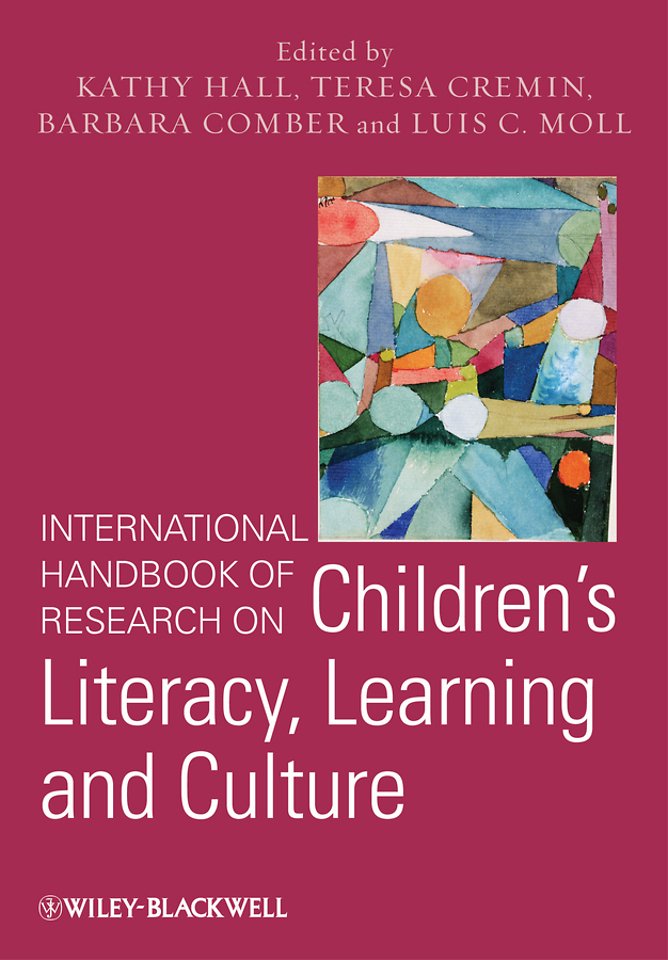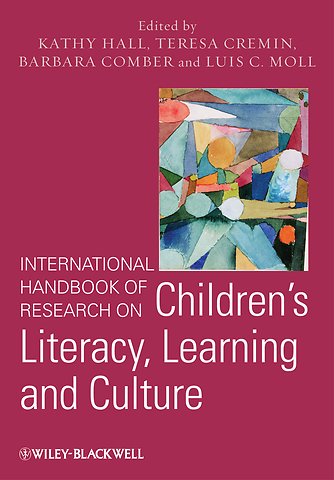International Handbook of Research on Children′s Literacy, Learning and Culture
Samenvatting
The International Handbook of Research in Children′s Literacy, Learning and Culture presents an authoritative distillation of current global knowledge related to the field of primary years literacy studies.
Features chapters that conceptualize, interpret, and synthesize relevant research
Critically reviews past and current research in order to influence future directions in the field of literacy
Offers literacy scholars an international perspective that recognizes and anticipates increasing diversity in literacy practices and cultures
Specificaties
Inhoudsopgave
<p>List of Reviewers xxvii</p>
<p>Foreword xxix<br /> Kris D. Guti´errez</p>
<p>Editors Introduction: Literacy, Learning, and Culture xxxvii<br /> Kathy Hall, Teresa Cremin, Barbara Comber, and Luis C. Moll</p>
<p>Part I Society, Culture, and Community</p>
<p>1 Literacies in Homes and Communities 3<br /> Kate Pahl and Cathy Burnett</p>
<p>2 Critical Multimodal Literacies: Synergistic Options and Opportunities 15<br /> Margaret Mackey and Margaret Shane</p>
<p>3 Books, Toys, and Tablets: Playing and Learning in the Age of Digital Media 28<br /> Helen Nixon and Erica Hateley</p>
<p>4 Literacy Education in the Age of New Media 42<br /> Bill Green and Catherine Beavis</p>
<p>5 Connecting with Parents and the Community in an Urban Primary School: Creative Partnerships to Build Literacy/ies 54<br /> Pat Thomson and Johanne Clifton</p>
<p>6 At Home and at School: Bridging Literacy for Children from Poor Rural or Marginalized Urban Communities 67<br /> Celia R. Rosemberg, Alejandra Stein, and Florencia Alam</p>
<p>7 Temporality, Trajectory, and Early Literacy Learning 83<br /> Catherine Compton–Lilly</p>
<p>8 This is a Job for Hazmat Guy! : Global Media Cultures and Children s Everyday Lives 96<br /> Victoria Carrington and Clare Dowdall</p>
<p>9 Literacy as Shared Consciousness: A Neurocultural Analysis 108<br /> Alicia Curtin and Kathy Hall</p>
<p>10 An Ethnographic Long Look: Language and Literacy Over Time and Space in Alaska Native Communities 121<br /> Perry Gilmore and Leisy Wyman</p>
<p>11 Understanding English Language Learners Literacy from a Cultural Lens: An Asian Perspective 139<br /> Guofang Li</p>
<p>12 Exploring Multiple Literacies from Homes and Communities: A Cross–cultural Comparative Analysis 155<br /> Iliana Reyes and Mois´es Esteban–Guitart</p>
<p>13 Funds of Knowledge in Changing Communities 172<br /> Luis C. Moll, Sandra L. Soto–Santiago, and Lisa Schwartz</p>
<p>14 The Hand of Play in Literacy Learning 184<br /> Shirley Brice Heath</p>
<p>Part II School, Culture, and Pedagogy</p>
<p>15 Building Word and World Knowledge in the Early Years 201<br /> Susan B. Neuman, Ashley M. Pinkham, and Tanya Kaefer</p>
<p>16 The Unfulfilled Pedagogical Promise of the Dialogic in Writing: Intertextual Writing Instruction for Diverse Settings 215<br /> Rebecca Jesson, Judy Parr, and Stuart McNaughton</p>
<p>17 Reading Engagement Research: Issues and Challenges 228<br /> Sue Ellis and Cassandra S. Coddington</p>
<p>18 Opening the Classroom Door to Children s Literature: A Review of Research 241<br /> Evelyn Arizpe, Maureen Farrell, and Julie McAdam</p>
<p>19 Writing in Childhood Cultures 258<br /> Anne Haas Dyson and Sophie Dewayani</p>
<p>20 Children s and Teachers Creativity In and Through Language 275<br /> Teresa Cremin and Janet Maybin</p>
<p>21 Educational Dialogues 291<br /> Karen Littleton and Neil Mercer</p>
<p>22 Literacy and Curriculum: Language and Knowledge in the Classroom 304<br /> Peter Freebody, Eveline Chan, and Georgina Barton</p>
<p>23 The Digital Challenge 319<br /> Sandra Schamroth Abrams and Guy Merchant</p>
<p>24 Digital Literacies in the Primary Classroom 333<br /> Rachael Levy, Dylan Yamada–Rice, and Jackie Marsh</p>
<p>25 Developing Online Reading Comprehension: Changes, Challenges, and Consequences 344<br /> Bernadette Dwyer</p>
<p>26 Hybrid Literacies in a Post–hybrid World: Making a Case for Navigating 359<br /> Elizabeth Birr Moje</p>
<p>27 Official Literacy Practices Co–construct Racialized Bodies: Three Key Ideas to Further Integrate Cultural and Racially Literate Research 373<br /> Karl Kitching</p>
<p>28 Emotional Investments and Crises of Truth: Gender, Class, and Literacies 388<br /> Stephanie Jones and Kristy Shackelford</p>
<p>29 What Does Human Geography Have To Do With Classrooms? 400<br /> Margaret Sheehy</p>
<p>30 Space, Place, and Power: The Spatial Turn in Literacy Research 412<br /> Kathy A. Mills and Barbara Comber</p>
<p>Part III Teachers, Culture, and Identity</p>
<p>31 On Becoming Teachers: Knowing and Believing 427<br /> Jennifer I. Hathaway and Victoria J. Risko</p>
<p>32 Reforming How We Prepare Teachers to Teach Literacy: Why? What? How? 440<br /> Brian Cambourne and Julie Kiggins</p>
<p>33 Teachers Literate Identities 456<br /> Toni Gennrich and Hilary Janks</p>
<p>34 Constructing a Collective Identity: Professional Development for Twenty–first Century Pedagogy 469<br /> Catherine M. Weber and Taffy E. Raphael</p>
<p>35 Raising Literacy Achievement Levels through Collaborative Professional Development 485<br /> Eithne Kennedy and Gerry Shiel</p>
<p>36 Teacher Research on Literacy: Turning Around to Students and Technology 499<br /> Christopher S. Walsh and Barbara Kamler</p>
<p>Index 515</p>

